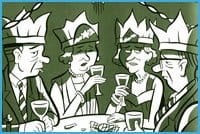
ODD & MACABRE FACTS. The book's really a straight-up story about Christmas celebrations in Canada Credit: (Seth)
Following a string of dark and demented publications featuring couturier vampires, spectral carnies and rough sex, Derek McCormack’s most recent book, Christmas Days, is a fascinating look at the history of Christmas in Canada. So it seemed like an ideal time to sit down with McCormack and find out his views on the holidays.
SANDRA ALLAND: Christmas Days is often macabre. Do you like Christmas?
DEREK MCCORMACK: I love Christmas. I love the weirdness, how life gets turned upside-down. Then, on the night of the 24th, things get eerily quiet. I like the eerie part. The hustle and bustle is tiring, but I’m from a family of storeowners – a Christmas without hustle and bustle was something truly scary.
ALLAND: Were there depressing facts that didn’t make it to the final draft?
MCCORMACK: I wanted to write about Tony Burgess, who’s my friend and one of the country’s greatest writers. He spent three Christmases as a Santa at the bus station on Bay. Between the exhaust fumes and the pharmaceuticals he was swallowing, he’d spend a lot of time passed out in the waiting room. Kids would pick his pockets.
ALLAND: What’s the most traditional thing you do for Christmas?
MCCORMACK: It’s all traditional. I spend Christmas with my sister and folks. Christmas night we dine with my aunt, uncle and cousins. The whole day’s down to a fine art: certain CDs playing, certain breakfast buns, certain phone calls at certain times. The least traditional thing is how early it starts. I buy my wrapping paper on Nov 1. I start listening to Christmas music in October. And I keep listening to it into February. There’s nothing like Christmas music after Christmas – it’s so desolate-sounding. It’s like when you’re a kid and you’ve finished opening gifts. You realize the fun’s over and everything starts to look really bleak.
ALLAND: What’s the worst present you ever received?
MCCORMACK: I’d be happy getting a handful of dirt, if it was wrapped nicely.
ALLAND: As a gay boy, were there presents you wished for and never received?
MCCORMACK: My parents were pretty indulgent. I remember them driving me into Toronto so I could go shopping where Carole Pope bought her clothes. The only thing I ever really wanted that I didn’t get was a McDonald’s plastic train. Is that a gay thing? Is Hamburgler slang for something?
ALLAND: Let’s talk elves. Do you have fantasies?
MCCORMACK: In the early years, elves had to dress the part…. That might get my engine going – teenage boys in tights and tunics. But now they wear khakis and polo shirts.
ALLAND: Was the Eaton’s catalogue your first porn?
MCCORMACK: It wasn’t, but I’ve heard men used to enjoy the male models. I understand Eaton’s men’s rooms were among the great cruising locales across Canada. I remember seeing men cruising in the washroom of the Eaton’s in Peterborough. I was old enough to know what was going on, but way too scared to try it. The washroom was next to the restaurant, the Paddle Boat. You could smell the gravy.
ALLAND: You’ve worked with two artists on your Christmas non-fiction, Ian Phillips for Pas de chance’s Faux and Seth for Christmas Days. Tell me about that process.
MCCORMACK: I sort of hatched the Faux idea with Ian. I mentioned that Christmas crackers used to come shaped like snowballs. He started experimenting with plaster and silly putty. The book that comes inside is all him – he did the illustrations and I oohed and aahed. It was the same with Seth. He made a mock-up of Christmas Days with the cover, illustrations and lettering already done. I loved it. He’d read the book so carefully – each illustration really captures a line or scene. I’m so lucky to work with these guys. They’re brilliant. It means a lot to me because I love visual art but I’m totally talentless when it comes to making it.
ALLAND: What have reactions been like to readings?
MCCORMACK: Weird. Younger people think I’m going to rip into the holiday, mock its consumerism. The book’s really a straight-up story about Christmas celebrations in Canada. Odd facts, maybe – it gets pretty macabre, as you say. But it’s done lovingly. Older folks laugh; it seems to bring back memories. That’s nice for me. When I write fiction, I only care if my friends like it. This book, I wanted to be entertaining. My mom’s euchre club was my target audience.

 Why you can trust Xtra
Why you can trust Xtra


